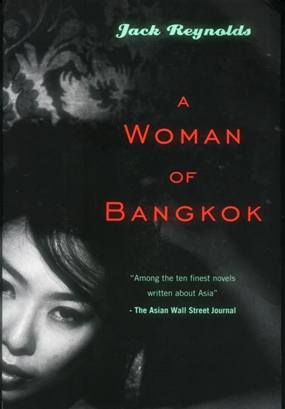The classic book describing the relationship between a love-sick young Englishman and the ultimate hardened Thai female prostitute. Set in the 1950’s, and written by “Jack Reynolds” A Woman of Bangkok (ISBN 978-981-08-5430-0, originally released in 1956 and now reprinted by Monsoon Books, Singapore, 2011), is still a spell-binder.
It shows its 1950’s vintage with some of the rather old-fashioned language not used today, such as “beery persiflage” and other items such as the Riley motor car used by the company the Englishman works for in Bangkok. A Riley these days is a collectors item!

The charm of this book is the way it reveals the inner psychological turmoil of the 27 year old English lad, who before he even arrives in Thailand is showing paranoia (gives up a promising career as a speedway rider after his friend dies) and an inability to handle relationships with the opposite sex, even to the extent of fantasizing about his sister-in-law. He is portrayed (as is the author) of being the son of a minister of religion.
He makes the momentous decision to go to Thailand, and very soon loses his virginity, but between romps becomes introspective once more – and then he meets a dancer called Vilai, known as the White Leopard.
Falling deeply in lust, which he confuses with love, his whole life becomes the relationship with Vilai, the woman of his dreams. (Or was that nightmares?)
Vilai is a hard-headed Thai woman, whose attitude to life is completely foreign to the attitude of a westerner. “And especially she despised white men because they despised her own race. There was only one good thing about white men: they had more money than anyone else. And it was her duty to get as much of that money off them as she could. For money was important; it was the most important thing in the world. If you had enough money, no one dare look down on you.”
It is in those descriptions that you can see the artistry of the author, and his very deep understanding of the Thai culture and its in-built pragmatism. Vilai says, “The Buddha forbids us to tell lies, and so we should never do so, unless of course it is absolutely necessary.”
Vilai’s son is killed, and once more the cultural divide leaves the westerner completely confused. Attitudes to life and death are just so different, and it is so easy, when looking from the western viewpoint, to make value judgments which really do not apply. That Vilai could go straight back to the dance hall is anathema to the English lad, but when looked at from Vilai’s perspective is entirely pragmatic.
The language as used by Vilai is entirely credible, such as “Many girl haff very sweet mouse but not spick truce.” (And if you can read and understand that easily, you may have been in Thailand too long.)
The RRP, according to the Asia Books website is B. 495, but is being advertised at the special price of B. 396. At either price, this book is more than worth the purchase price.




